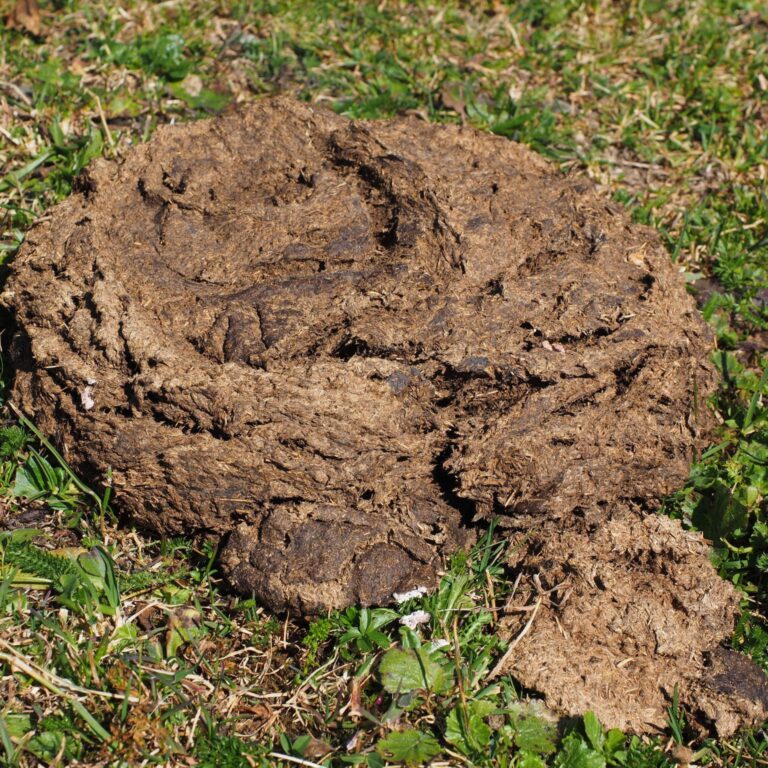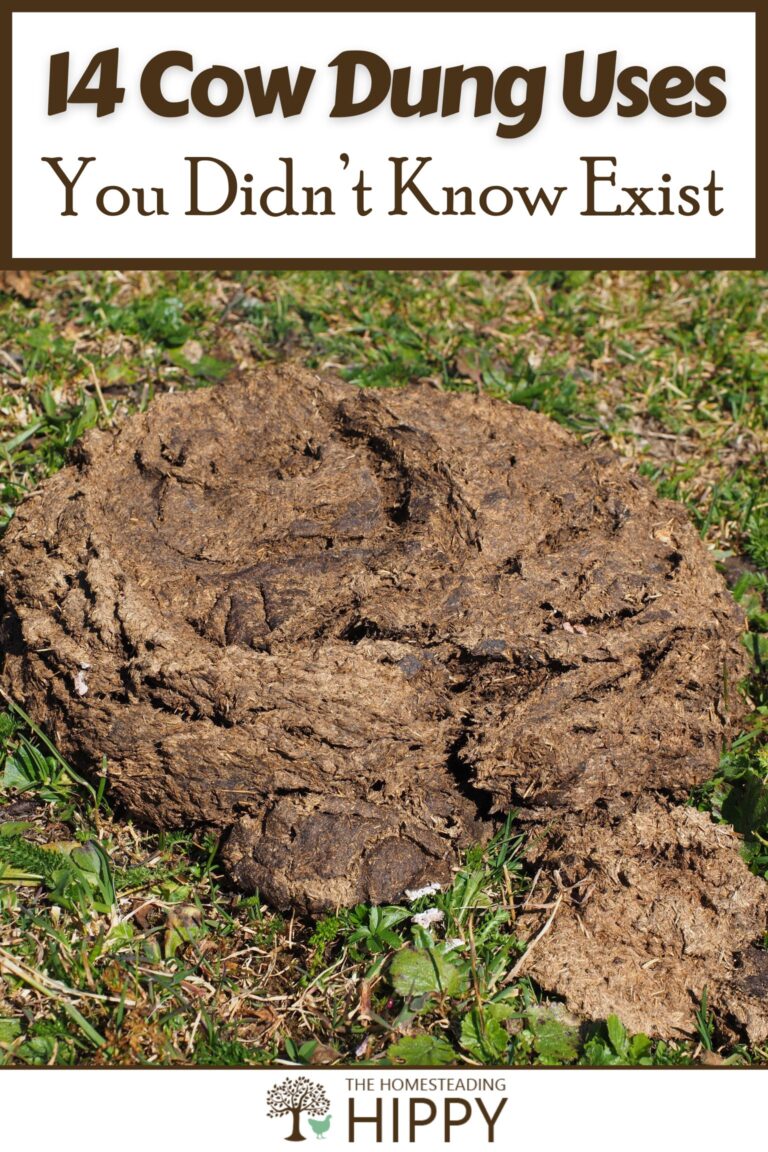If you’re like me, you probably think of cow dung as a smelly nuisance. But believe it or not, there are a ton of ways to use cow dung that you probably didn’t know about!

In this blog post, I’ll share some of the most interesting and unexpected ways to put cow dung to use. So if you’re feeling adventurous, keep reading! You won’t be disappointed.
What Exactly is Cow Dung?
Cow dung is the feces of cattle. It is mostly composed of digested grass and other vegetation, along with a small amount of minerals, manure, and water.
Depending on the diet and weight of the cow, a typical cow can produce anywhere from 15 to 35 liters (4 to 9 gallons) of dung per day.
In addition to being used as fertilizer, cow dung can also be used as fuel for fires or as a building material. In some cultures, it is even considered to have religious or spiritual significance.
Regardless of its many uses, there’s no denying that cow dung plays an important role in human and animal life alike.
What Are the Other Uses of Cow Dung?
Whether you are using it to fertilize your garden or treat an illness, cow dung is a versatile and useful substance. Here are some ideas.
1. As a Fertilizer
Cow dung is an effective fertilizer for crops. It enriches the soil with nitrogen, phosphorus, and potassium, which are essential nutrients for plant growth.
Furthermore, cow dung helps to improve the soil’s water-holding capacity, making it more resistant to drought.
Additionally, cow dung contains beneficial microorganisms that help to break down organic matter and release nutrients into the soil.
2. For Improving Heavy Soils
Anyone who has ever tried to grow plants in heavy clay soil knows how difficult it can be. The soil is dense and doesn’t allow water or air to penetrate, making it difficult for roots to take hold.
Moreover, the clay particles can bind together, making it hard for plant life to break through.
However, there is a natural way to improve heavy soils – by using cow dung. Cow dung is rich in organic matter, which helps to break up the clay particles and improve drainage.
3. Playing Games
In some cultures, cow pies are considered good luck, and they are often used in games of chance. Cow pie bingo is a popular game in which players try to predict where a cow will poop on a field or lawn.
Cow chip throwing is another popular game in which contestants compete to see who can toss a cow pie the farthest.
While these games may seem silly, they actually provide an important service by helping to spread cow dung around the field or lawn, which can help to fertilize the soil and promote new growth.
4. To Make Paper
We all know that paper comes from trees. But did you know that you can also make paper from cow dung?
That’s right – cow dung can be used to create a variety of different papers, from construction paper to toilet paper. And it’s not as gross as it sounds!
The process of making cow dung paper is actually quite simple. The dung is first mixed with water and then strained to remove any large pieces.
It is then placed in a vat with other pulp materials, such as wood or straw, and heated until it forms a papery pulp.
The pulp is then placed on a screen and pressed to remove any excess water. Once the water has been removed, the pulp is dried and then rolled into sheets of paper.
So why bother making paper from cow dung? Well, for one thing, it’s a great way to recycle waste material. And since cows are such common animals in many parts of the world, there’s no shortage of raw material!
Additionally, cow dung paper is actually quite strong and durable, making it ideal for a variety of applications.
5. Fuel and Biogas
Biogas is a clean-burning fuel that can be used for cooking, heating, and even generating electricity. It is made by breaking down organic matter in the absence of oxygen, a process known as anaerobic digestion.
Cow dung is a good source of organic matter for this purpose, and when it is broken down in this way it produces methane gas – the main component of biogas.
There are many advantages to using biogas as a fuel. It is renewable and environmentally friendly, and it can help to reduce dependence on fossil fuels.
Moreover, it is often cheaper than traditional fuels such as petrol or diesel. In many parts of the world, cow dung is becoming an increasingly important source of energy.
6. As Vermicompost Food
When used as vermicompost, cow dung can provide essential nutrients and help improve soil structure.
Vermicompost is made by mixing cow dung with other organic materials, such as leaves and kitchen scraps. The mixture is then placed in a bin where worms are added.
The worms help to break down the organic matter, resulting in a rich compost that is full of nutrients. Vermicompost can be used to improve any type of soil, but it is especially beneficial for sandy soils that lack fertility.
7. As a Building Material
Cow dung is an excellent insulator, helping to keep homes cool in the summer and warm in the winter. Cow dung is also fire resistant, making it a safe material to use in construction.
In addition, cow dung is cheap and readily available, making it an attractive option for many people.
8. An Insect Repellent
Cow dung has long been used as an insect repellant. The strong smell of the dung helps to keep pests away, and the dung itself can be used as a barrier to block their access to homes. In addition, cow dung contains a variety of chemicals that are toxic to insects.
These include ammonia, hydrogen sulfide, and methane. As a result, using cow dung as an insect repellant can be an effective way to keep your home pest-free.
9. A Disinfectant
When mixed with water, cow dung can be used to cleanse wounds and disinfect surfaces. It’s even effective against some bacteria, such as E. coli and Staphylococcus.
In recent years, there has been renewed interest in the use of cow dung as a natural disinfectant, as resistance to antibiotics continues to grow. While more research is needed to confirm its efficacy, there’s no doubt that cow dung has many benefits.
10. To Make Pots for Plants and Flowers
Cow dung is rich in nutrients and helps to regulate moisture levels, making it an ideal material for pots. In addition, the pot will break down over time, releasing these nutrients into the soil. To make a pot, start by shaping the dung into a ball.
Then use your hands to mold it into a bowl shape. Once you have the desired shape, allow the pot to dry in the sun for several days. Once it is completely dry, you can then plant your flowers or plants.
11. For Insulation
Cow dung has been used as a construction material for centuries. More recently, it has gained popularity as an insulation material due to its high insulation value and low cost.
Cow dung is composed of 75% organic matter, which provides good insulation against heat and sound.
In addition, cow dung is fire resistant and has a high moisture retention capacity, making it an ideal material for humid climates. Moreover, cow dung is a renewable resource that is readily available in many parts of the world.
12. In Art
Cow dung artisans create intricate designs on walls and floors using nothing but cow dung and water.
The results are truly stunning, and the use of such a humble material lends the artwork a sense of earthiness and authenticity. Cow dung art is still relatively unknown outside of India, but it is sure to garner attention and admiration from all who see it.
13. Uses in Religious Ceremonies and Rituals
In Hinduism, the cow is seen as a holy symbol of life and abundance. As such, cow dung plays an important role in many religious ceremonies and rituals. In the fire yajna, for example, cow dung is used as an offering to the gods.
It is also used in the making of panchagavya, a mixture of five products derived from the cow (milk, curd, ghee, urine, and dung).
This mixture is used in a variety of Hindu rituals, such as puja (worship) and abhisheka (ritual bathing).
Cow dung may not be everyone’s idea of a spiritual or healing agent, but for Hindus it plays a vital role in both religious and medical traditions.
14. As a Medicine?
In many traditional societies, cow dung is considered to have medicinal properties and is used to treat a variety of ailments. In India, for example, cow dung is used to treat skin diseases, stomach problems, and even snake bites.
While there is no scientific evidence to support these uses, some people believe that cow dung has natural detoxifying and healing properties.
While using cow dung as medicine may not be mainstream, it is certainly an interesting practice that has been used for centuries in traditional cultures.
How to Compost Cow Dung
Cow dung is an excellent source of compost for the garden. Unlike other manure, it is relatively dry and does not contain many weed seeds. In addition, it is high in nitrogen, which is essential for plant growth.
To make compost from cow dung, first dig a hole in the ground that is at least 3 feet deep. Next, fill the hole with dung and cover it with a layer of straw or hay. Finally, add water to the hole until it is completely filled.
The dung will break down over time, producing rich compost that can be used to improve the quality of the soil.
Tips for Handling Cow Dung Safely
Despite all of its benefits, cow dung can also be dangerous if it is not handled properly. Here are some tips for handling cow dung safely.
- Wear gloves and a mask when handling cow dung. This will protect you from bacteria and other harmful organisms.
- Avoid touching your face or eyes while handling cow dung. If you do come into contact with cow dung, wash your hands immediately.
- Don’t eat or drink while handling cow dung. This will reduce your risk of exposure to bacteria.
- Do not allow children or animals to come into contact with cow dung. Cow dung can contain harmful bacteria that can cause illness. Always wash your hands after handling cow dung. This will help to prevent the spread of bacteria.
Where to Find Cow Dung
For those who are interested in using cow dung as a fertilizer for their gardens, there are a few options available. If you raise cows, that’s obviously the easiest way to get some for your homestead, but there are other options available as well.
One option is to purchase manure from a local farmer or stable. This manure can be spread directly on the garden, or it can be composted first.
In some cases, you may be able to purchase composted cow manure from a garden supply store, too.
Another option is to gather cow dung from a pasture if a farmer will allow you to do it. This dung will likely contain more weeds and grass, so it will need to be composted before using.
Regardless of where the cow dung is sourced, it can be an excellent addition to the garden, providing nutrients and improving soil structure.
Final Thoughts
So there you have it – 14 everyday uses for cow dung in some way or another. From cosmetics to construction, this humble waste product is being put to good use all over the world.
Have you tried any of these products? Do you know of any other interesting uses for cow dung? Let us know in the comments below!


Rebekah is a full-time homesteader. On her 22 acres, she raises chickens, sheep, and bees, not to mention she grows a wide variety of veggies. She has a huge greenhouse and does lots of DIY projects with her husband in her ever-growing homesteading endeavor. Learn more about Rebekah here.
